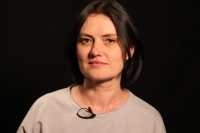I was very obsessed with psychology because I was always interested in why people are so identical on the outside: two arms, two legs, one head, but we act so differently. I've always been interested in this: what goes on in a person's head, what one does like this, why one becomes, I don't know, world-famous, and why another lives their life somehow differently. I always told my mom that I wanted to be a psychologist. And she said, “What does that mean? Where are you going to work?” It was something so confusing. And this was indeed a period when there were no psychologists in schools, in kindergartens; it was not the norm, as it is now. My mother set this [condition for me]... it sounded something like this: if your father gives you money for school, for university, you go, and if he doesn't, you have to understand that we don't have the money. I don't know why there was no option for me to go on a state-funded scholarship, even though I was a very good student. It was not addressed at all. Somehow it was set up in such a way that university is only for the wealthy. But my sister also told me, “Natalia, why don't you enter a state-funded program?” Well, I already had this idea: if my dad gives me money, I go to university, if he doesn't, that's it. And my dad didn't give me any money for my studies. My mom somehow started working with me, talking to me, saying, “Natalia, think about a seamstress. A seamstress will always sew a curtain or a pair of pants, and you will always have a way to make ends meet.” And by the time I was sixteen, in the eleventh grade, I just wanted to get out from under my mother's care, and I didn't care where I was going to enroll, I knew that everything was out of the question — no money, then I couldn't even take as much as a look at university, so I entered a vocational school — at that time it was called a technical school — to become a sewing production technician in Kramatorsk. Later, many years later, I realized that all my classmates had gone to university, many of them on a state-funded basis, and I know for sure that I could have gone, but I didn't even have that thought. When I realized this, it was such an epiphany for me. Why didn't I even think of trying? I didn't even try. So, I entered Kramatorsk to study to become a sewing production technician, and that was my first education...
